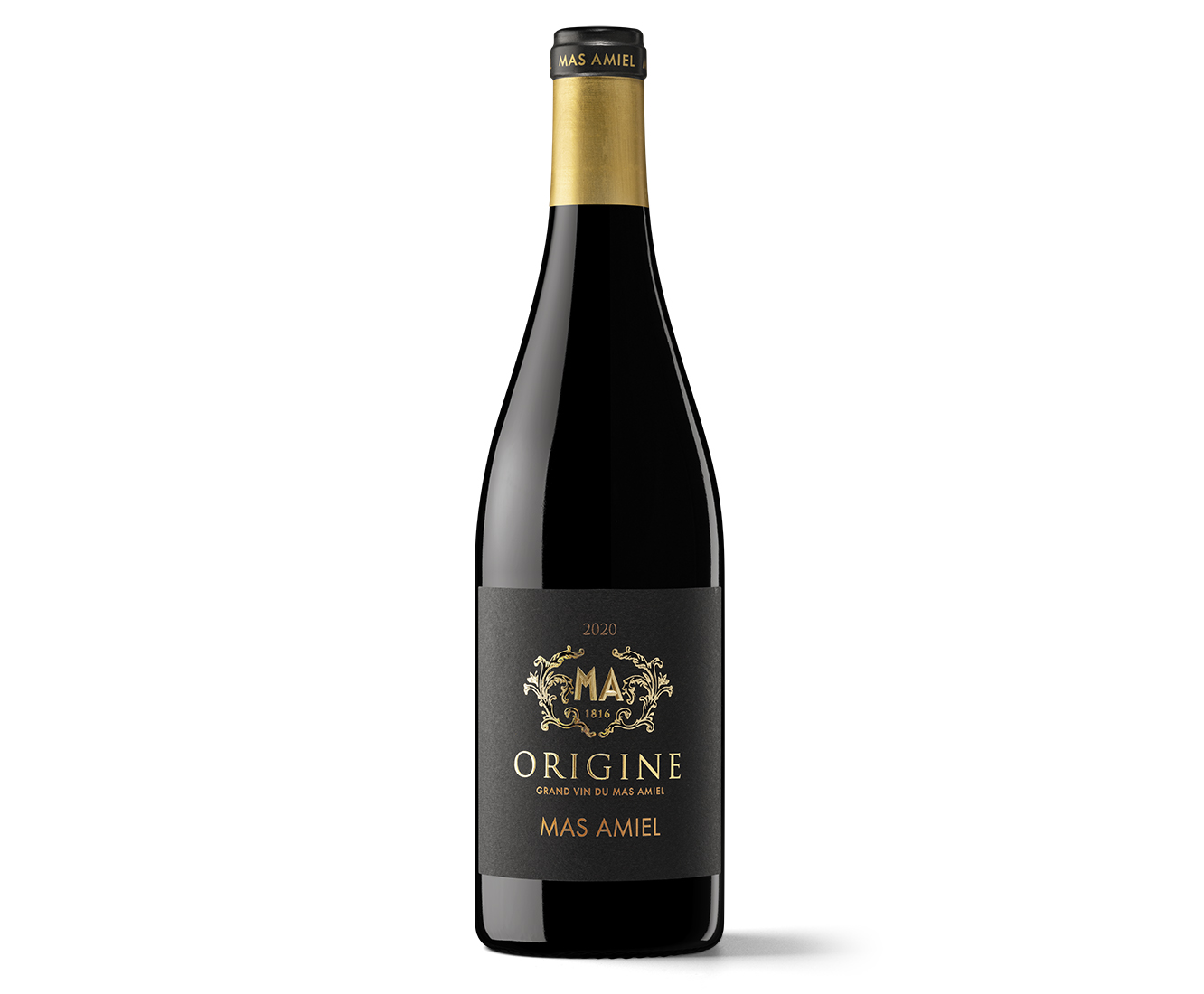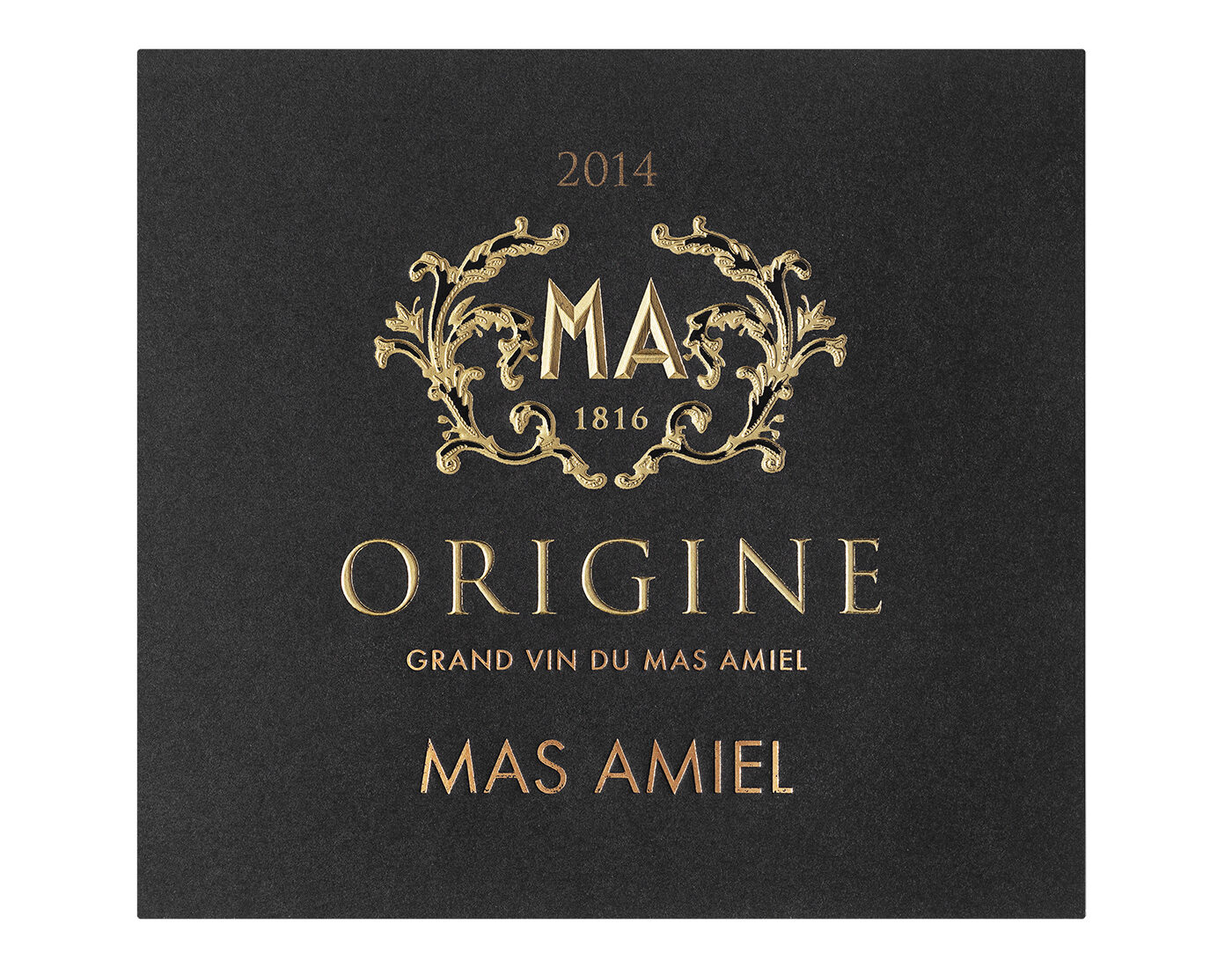Etifrance, the subsidiary of Vidal & Armadans in the south of France, has taken on some extremely complex production with Origine. Its pyramidal embossing requires a special technical skill based on a thorough knowledge of tooling apps, inks and papers. A challenge brilliantly solved by a label that has an irresistible look and feel. An invitation to feel Mas Amiel’s unique commitment to its surroundings: a mix of presence and hedonism. Classical culture in its purest form.
What is Mas Amiel?
Mas Amiel is diversity and history. An estate and winery founded in 1815 nestled in the landscape of the Maury valley, on the northwest side of the Pyrénées-Orientales department, near Perpignan. Its surroundings have been deeply committed to viticulture, truly diverse in the sum of its locations, orientations and geologies. Mas Amiel is made up of 130 plots, each with its own identity in terms of exposure, altitude and soil types, ranging from schist and gneiss to calcareous soils. We grow grape varieties on this traditional estate that are specific to the area, such as Carignan, Grenache and Hairy Grenache, so as to create a rich collection of sweet and dry wines.hat is Origine?
Why that name?
It is our premium cuvée still wine. A red wine pervaded by the accent of the south, with breadth and generosity, and always with subtlety. It is a mix of three varieties: Mas Amiel’s oldest Red Grenache, planted in 1914, brings finesse; Carignan brings verticality; and finally, Syrah adds a spicy touch and true freshness. All this makes for a refined, precise and pure ensemble, reflecting the strong imprint of the terroir on the texture and minerality of the wine.
How would you describe the wine?
Deep and enigmatic! It opens with intense notes of plum and black cherry. It is vibrant and well-defined on the palate. It retains great unctuousness and texture that combines notes of black fruits with a highly subtle spicy touch. Its tannins have great finesse, and its origins in the highly elegant chalky minerality of the terroir are noticeable. It has aromatic persistence and a fresh, refreshing sappy finish. It is a perfect mix of power and elegance.
What is its target market or segment?
It is clearly aimed at consumers looking for the most direct and clear identity of Mediterranean vineyards through an expression of the utmost finesse.
Its very formalist and classical label is striking. What is Origine’s design all about?
We wanted it to reflect an underlying idea, explicitly focused on the tradition of historical wine production in our Mediterranean area. The idea that our origins are clear and rest on classical winemaking. It also refers to a stance in favour of making an elegant, fine, distinguished and noble wine. With the ancient nobility of an old estate that has stood the test of time and has known how to keep up with the times. This is the meaning of true elegance for Mas Amiel, as well dressed and presented as it is on this label.
And whose lettering could not be more Roman. What does it add?
It clearly connects us with classical culture. Because a wine is the fruit of a place, but it is also a cultural idea, built over time by a social context, in this case a place closely related to the Mediterranean civilisation of Greco-Roman lineage. This entire set of links is what we believe its Roman lettering evokes.
And it benefits from its high embossing.
Exactly, an embossing that is technically called pyramidal. Achieving this effect in print is complex and not all workshops can do it. In fact, we set Etifrance with this challenge. The printer was able to achieve it, and the result is even better than we expected.
What does the future hold for Mas Amiel?
Our path is determined by biodynamic viticulture. Any improvement is always in the vineyard, in the quality and purity of the grapes. We believe this is where the balance lies, and no process that we do in the winery will improve anything after the harvest. This may seem contradictory for a house like Mas Amiel, which has always specialised in long ageing cellar wines, both oxidative and naturally sweet. But this is not the case, for we have noticed over time that excellence in the field is later transferred to much better old wines. And naturally to still wines of great complexity and presence, such as Origine.


